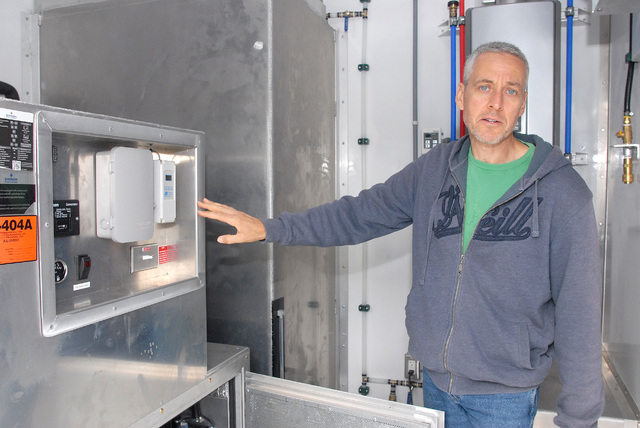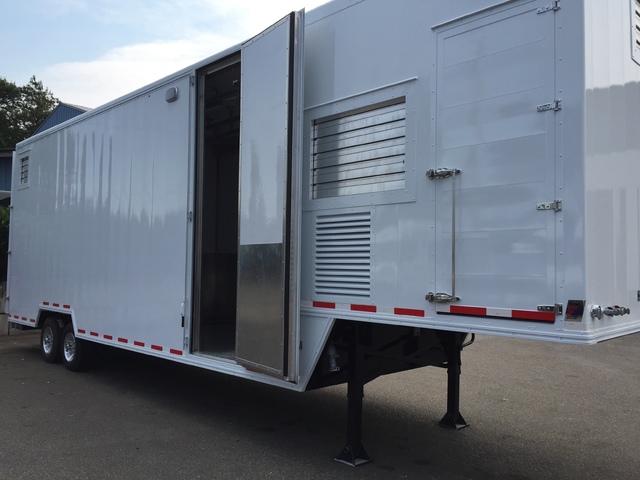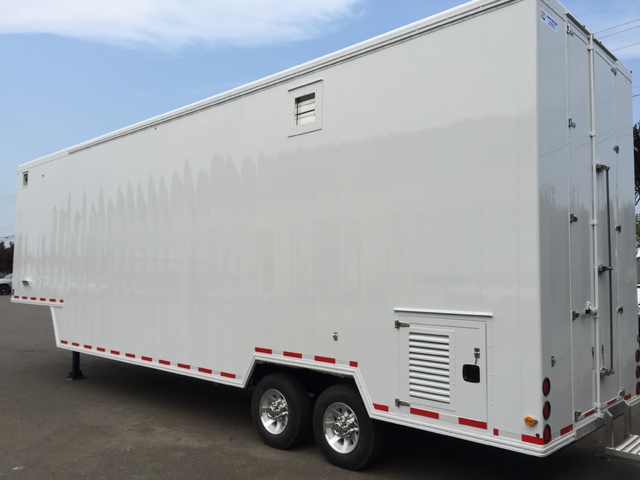Mobile slaughterhouse nearly ready to roll
The future of Hawaii Island meat is parked in Waimea.
ADVERTISING
The state’s first producer-owned mobile slaughterhouse arrived in October, and will provide a means for small-scale ranchers and farmers to access local retail markets when it opens for business.
The 36-foot trailer is equipped with electric winches and refrigeration, a generator, enough water for two days, and a stainless steel processing room — almost everything needed to bring the slaughterhouse to the herd, instead of the other way around.
Though operations won’t begin until the second quarter of 2016, a review process for hiring butchers is underway. Training events hosted by professionals from the Island Grown Foods Coop in Washington state are planned for January.
“We’re progressing along,” said Mike Amado, president of the Hawaii Island Meat Cooperative, which owns and operates the unit. The co-op was formed in 2014, three years after the first task force investigating the feasibility of a mobile slaughterhouse began its work.
Since then, the group has secured more than $500,000 in grants from a host of sources, including the U.S. Department of Agriculture, the state Agriculture Department, Hawaii County and the Big Island Resource Conservation &Development Council.
“It really is illustrating and emphasizing the importance of a project like this,” Amado said of the co-op’s grant-writing success.
About 83 percent of the island’s beef is imported, according to the Kohala Center. The amount of imported pork, lamb and goat is still more dramatic: 95 percent.
For ranchers and farmers, the meat model typically involves raising animals to wean-off and then sending them to the mainland.
But demand for local meat, particularly grass-fed, has been on the rise for several years.
“We’re really reconstructing a piece of the food infrastructure,” Amado said. On the mainland, operations have been consolidated to account for high volume, but that model doesn’t fit the Big Island’s needs.
The co-op is now working to fund the second phase of the project, which will add a dedicated cut-and-wrap facility to the unit. That way, customers can get small cuts of meat.
“Otherwise, all that we’re producing is halves and quarters,” Amado said. “It’s not like your average grocery consumer can go get those.”
Membership drives began last fall, after the unit had arrived from the mainland.
The biggest challenge was simply convincing producers that the mobile unit was here to stay.
“It’s been talked about for so many years, and some are skeptical,” Amado said. “They really want to make sure we have that cut-wrap piece … we have quite a few people that are on the sidelines saying that as soon as we have that, they’re in.”
In the meantime, the co-op is working with private individuals to set up processing at three locations around the island.
One is in Kohala, led by board member Carol Fuertes.
“We definitely want to do the processing here so the meat can stay local,” Fuertes said.
Fuertes’ family has been ranching cattle for decades. She and her husband founded Kohala nonprofit Kahua Pa‘a Mua and teach Korean natural farming techniques.
They also raise pigs and chickens.
There’s a “real imbalance” in the island’s pork economy, Amado said. “We could probably grow a lot more than we need here … people are saying, ‘OK, as soon as this (the unit) is in place, we’ll ramp up production.”
“We want to be able to … have a place that we can say, ‘Hey, come here and eat the local food,’” Fuertes said. “We know a lot of people that raise sheep and goats, and I don’t know how they’re marketing it, really, other than to family and friends.”
Raising animals to share among families is “how we live,” she said. “It’s the way of life here, but to have this (unit), it’s an opportunity.”
That collective way of thinking carried over to the co-op-based business model for the mobile unit.
“That was one of our commitments, to keep it as democratic as possible,” Amado said.
There is a mobile slaughterhouse in operation on Kauai, though it is privately owned.
Lanai once had one to address axis deer management, but Amado said the project had since shut down.
The Big Island unit is also intended as an incubator to encourage new farmers. Fuertes said she hopes production will help provide meat for hospitals and schools.
In the long term, the group also hopes to bring a mobile poultry unit to the island. There are no facilities for poultry here.
“When you contrast to the volumes of poultry being imported into the state, we could easily have a significant impact on the food economy here,” Amado said.
For more information about the Hawaii Island Meat Cooperative, visit HawaiiIslandMeat.com.
Email Ivy Ashe at iashe@hawaiitribune- herald.com.






